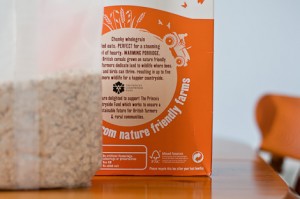OK, to some of you this may not seem like a big deal, but I am increasingly paying more attention to packaging and am trying to buy products with less packaging. Where packaging is essential, then recyclable or recycled packaging is the preferred option. I recently had cause to change my brand of porridge oats (mainly because Waitrose have a habit of putting them on offer and running out of stock) so, my environmentalist head thought that it would try Jordans who are seem to be doing quite a lot for wildlife and sustainability.
All appeared to be OK, there are notes on the back of the packet about their work with farmers and nature-friendly methods. However, when I opened the box I was hugely disappointed to see that there was a bag inside the cardboard (unlike my usual brand) – do porridge oats really need to havetwo layers of packaging – they are not very likely to go off? What was even more disappointing though was that they did not respond to my email asking why they felt the need to add in the extraneous bag. This is not to say that I will not buy their product again, because now I have done some digging I have discovered that unlike Jordans, my usual brand does not state the origin of their oats. (I have therefore sent an email asking for their oaty origin, but usually, if they are not shouting about it they are not sourcing from the UK.)
My search for packaging information has also resulted in the discovery of a symbol on the cereal box that I had never noticed before – the orange and white arrows in the bottom right corner of the box shown in the picture above. Whilst this is obviously not a recycling symbol, it does look as though it is related – one could maybe assume that the packaging was made from recycled materials. Unfortunately this is not the case as a quick search around the Jordans website revealed. The intertwined arrows merely show that the Company is complying with European regulations. Companies over a certain size (turnover) or who buy above a threshold of packaging must ‘recover’ that packaging. In practice this means that the Company pays a certain amount into a scheme which then recovers / recycles a certain proportion of packaging material. So, in reality the intertwined arrows just mean that Jordans are not breaking the law on packaging waste regulations – not that they are doing anything special to help the environment.
Whilst Jordans are not the only company to put this symbol on their cartons I think that it is certainly misleading – I didn’t know what the symbol meant and I am responsible for ensuring that our company pays a sufficient amount into one of these schemes!
